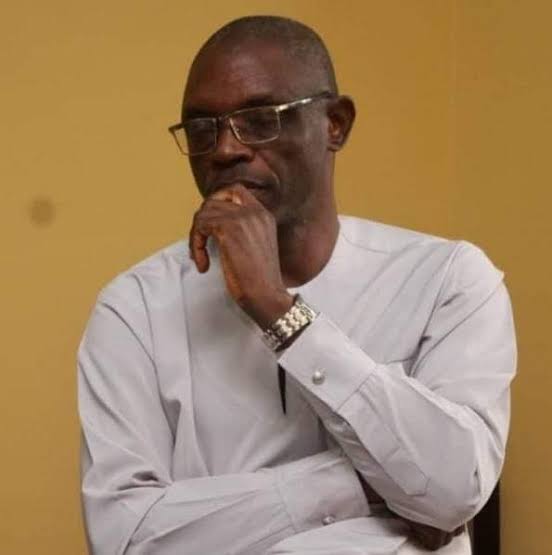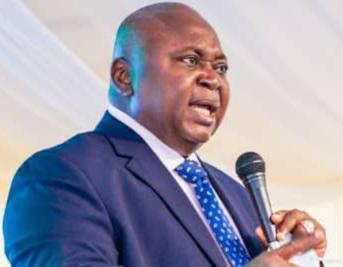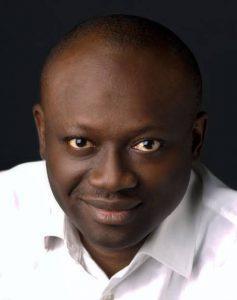Where witches contend and exchange punches, mere men do not stand by to watch. But part of the job of a journalist is to see and report; sometimes he runs commentaries on bouts – not minding if the pugilists are gods or principalities. There is an ongoing offshore Bola Tinubu versus Atiku Abubakar rumble-in-the-jungle, a perfect heavyweight bout between power potentates. These two used to be very good friends and political soul mates. But Pompey the Great and Julius Caesar were also allies and in-laws. Yet, when it was time for Caesar to confront Pompey by crossing the Rubicon in January 49 BC, he did so without looking back. Caesar crossed that river after charging his army with the famous lines: “Let us go where the omens of the gods and the crimes of our enemies summon us. The die is now cast.” With those words, Julius Caesar determined his own fate; he sealed the fate of Pompey and altered the course of their country’s history forever.
In faraway Chicago, United States, Atiku and Tinubu spent the whole of last week panting for balance as they perched on the alien branch of the US judicial system. For whatever reasons, Tinubu has been fighting very hard to fire-proof his university records. He failed the first time; he failed the second time less than 48 hours ago. The court bout continues today over who has or does not have certificates. Tomorrow, it will be over; we will know who is a liar between the two friends; we will know if our president is a man or woman; we will know if Tinubu will be free and Atiku will be silenced forever.
In its handling of this case, the American judiciary has comported and discharged itself with admirable cleanliness. We’ve seen speed; we’ve seen so much openness, decorum, competence and diligence. We’ve seen a strict adherence to rules and facts. In the rulings, there were no abusive words, no bad grammar, no dodgy logic, no invidious, shameful technicality. There was no duplicitous dithering in delivering prompt justice; the sentences were simple, the language was plain, there were no ambiguities on what the court meant and what it said. I would recommend all that ennobling work ethic to what we have here as judiciary.
Nigerians who are following the US case are shocked at the consideration for time and respect for timeliness by the two courts that have handled the matter. Nigerian judges and lawyers surely have something to learn from those judges.
Evergreen English novelist, Charles Dickens, wrote in his ‘Bleak House’ that “it won’t do to have truth and justice; we must have law and lawyers.” I rewrite that to read: it is not enough to have law and lawyers; it is more important to have truth and justice. But you can’t have justice where the process is programmed to surrender to roadblocks and succumb to bottlenecks. The United States District Court for the Northern District of Illinois delivered its ruling two days ago. It gave an order and remembered to give a deadline for compliance with that order. Very quickly and with an air of finality, it stressed that it would “not extend or modify these deadlines” because of the injustice that would attend its doing so. The court even told the party that lost not to bring an application for a stay of its order saying “… any request for a stay before this court will be denied.” The words of Justice Nancy L. Maldonado in making those declarations were clear and direct.
The case suffered no wicked adjournments and delays. Is that not how it should be, ordinarily? 17th century English philosopher and jurist, Sir Edward Coke, wrote on the imperative of speedy trial of cases. It is to him we owe the phrase “justice delayed is justice denied.” William Shakespeare in ‘Hamlet’ describes “the law’s delay” as the “whips and scorns of time.” Everyone, including those who do it, knows that delayed remedy is zero remedy. Lord Denning, Master of the Rolls, said something similar: “Delay of justice is a denial of justice…To put right this wrong, we will in this court do all in our power to enforce expedition.” I wish I could find a phrase like that to quote from the Nigerian judiciary. A judicial system that is built on opacity of procedure and deliberately slow administration of justice will ultimately breed its own destruction. How? Victims of delayed justice feel helpless; they see the system as being rigged against them; they feel cheated, frustrated and angry; they develop their own idea of justice without recourse to the courts; they take the law into their own hands.
Chicago State University has been firmly asked to bring to court the bird in its pocket. We wait to see the colour of that bird. While every Nigerian holds their breath on how this Chicago case ends, I suggest they go back and read how the Pompey versus Caesar contest ended. We have the whole of today to do that.
Tomorrow will come and we will see the end of the Atiku-Tinubu mud fight in a foreign land. While we wait and watch the tragedy, shall we ask questions of our country and interrogate why we are where we are? This is particularly important when you know that whatever happens in that Chicago case may not have any positive impact on the life we live. We are on holiday because independent Nigeria was 63 yesterday. But I feel what we marked could not have been a celebration of the country’s’ independence anniversary; it looked more like the funeral of its promise.

We have become a country of beggars. Almost every call or text message is a desperate request for help. I am almost certain that the economic pain we feel today has never been felt by any generation of Nigerians since the country was created by the British in 1914. Apart from the power people and their friends who spawn excess, everyone else yawns in want. If the country hasn’t collapsed, tell me what has happened to it.
The United States dollar crossed the expressway and exchanged for one thousand naira last week. In simple terms, it means a bullion van of one billion naira now weighs just 100 bales of $100 dollar bills (one million dollars). What is the worth of an increasingly worthless currency?
Exactly one hundred years ago (1923), the photo of a German lady using banknotes to light her stove shocked Germany. Yet, a year earlier, some boys were shown flying a kite made of their country’s useless currency. There was, in another photo, a man using the currency notes as wallpaper because it was cheaper to use than buying “the cheapest rolls of wallpaper.” Before the outbreak of the First World War in 1914, the exchange rate of the German mark to the American dollar was 4.2 to one; same as the British shilling, the French franc and the Italian lira. But Germany lost the war and entered turbulence. By November 1923, the German mark had fallen to 4.2 trillion marks to one US dollar. “A wheelbarrow full of money couldn’t buy a newspaper,” a commentator reminisced, and added: “Shopkeepers couldn’t replenish their stock fast enough to keep up with prices, farmers refused to sell their produce for worthless money, food riots broke out, and townspeople marched into the countryside to loot the farms. Law and order broke down. The German attempt at democracy had been completely undermined.” Is that where Nigeria is going?
What is the future of presidential democracy in Nigeria? I do not know if our politicians are hearing what the people are saying about this question. They say it benefits only politicians and their palaces and that it has wrecked the people. Democracy has failed Nigerians and everyone knows.
Guinea’s military Head of State, Mamady Doumbouya, addressed the UN General Assembly in New York on Thursday, September 21, 2023. He questioned the credentials of Western democracy and the good it had done for the people of Africa. Did our leaders listen to his concern on the unequal distribution of wealth which he said created endless inequalities, hunger and poverty? “When the wealth of a country is in the hands of an elite while newborns die in hospitals due to lack of incubators, it is not surprising that…we are seeing transitions to respond to the profound aspirations of the people,” he said. Nigeria’s President Bola Tinubu also told the United Nation’s Secretary General, António Guterres, two weeks ago, that to engage in talk shows while real poverty “wreaks real havoc in real time” was unacceptable: “Trace those of us here to our foundations and you will find that we have ties and links with poverty. We must not be ashamed of that history, but poverty is unacceptable. I am one of the lucky survivors of gripping poverty.” That was from Tinubu. But it is not enough for this man of means to fetishise (or romanticise) his years of want. Today’s poor do not need his story; what they need are positive actions against the demons of misery strutting the landscape. The same man, on Sunday, in his independence broadcast to the nation, announced an additional N25,000 monthly for low-grade workers for the next six months. Faced with threats of workers strike, his government later expanded the award to cover all treasury-paid workers; some hours later it jacked up the pay to N35,000. Just like that. Good. But the president has not told us what would happen to the beneficiaries after the golden six months.
With our country clocking 63 years in pain and turbulence, shouldn’t we decide now that enough is enough? Michelle Obama said during the recent US Open 2023 that “when things lie in the balance, we all have a choice to make. We can either wait around and accept what we’re given. We can sit silently and hope someone else fights our battles. Or we can make our own stand.” Some of us took a stand a long time ago: we won’t be silent or keep quiet. We won’t stop asking Nigerians to accept to be their own physicians. For members of my own generation, how many years have we lived? If things continue as they are, how many more do we have? Bob Marley’s ‘Exodus’ tells you to open your eyes “and look within.” And you look as commanded. And the song asks if you are “satisfied with the life you’re living?” Of course, you have looked “within” and what you see you do not want (even for your enemy) but you think you are forever helpless. It is like everyone desiring heaven but nobody wanting to die. How do we enjoy the bliss of paradise without dying?
At independence, our national anthem came with a promise that “our flag shall be a symbol/ that truth and justice reign.” The generation of Nigerians who sang that song promised “to hand on to our children/ a banner without stain.” We proceeded to ask God of all creation to grant us one particular request: “Help us to build a nation/ where no man is oppressed” so that “with peace and plenty/ Nigeria may be blessed.” We aborted that promise. That abortion was celebrated with pomp in Abuja yesterday by those in power; the poor marked it asking why they had to be hungry when their country was said to be very rich. There is so much wealth around and about us but there is also so much misery and want. Paradox is the only figure of speech that will explain that. Our situation is difficult to explain but it is not very different from an epoch strung together by Charles Dickens in the opening lines of his ‘A Tale of Two Cities’: “It was the best of times, it was the worst of times, it was the age of wisdom, it was the age of foolishness, it was the epoch of belief, it was the epoch of incredulity, it was the season of Light, it was the season of Darkness, it was the spring of hope, it was the winter of despair, we had everything before us, we had nothing before us, we were all going direct to Heaven, we were all going direct the other way…” We know what the other way of Heaven is. That is where 63-year-old Nigeria is, right now.



















